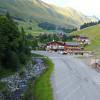Ninotinib (sold as Tasigna by Novartis) is a type of biological therapy called a tyrosine kinase inhibitor (TKI). Nilotinib blocks a tyrosine kinase protein called Bcr-Abl. The protein is made by chronic myeloid leukaemia cells that have an abnormal chromosome called the Philadelphia chromosome. Blocking this protein stops the leukaemia cells growing.
A study conducted at Georgetown (published July 11, 2016 in the Journal of Parkinson’s Disease) providing molecular evidence that nilotinib significantly increased brain dopamine (the chemical lost as a result of neuronal destruction) and reduced toxic proteins linked to disease progression in Parkinson’s disease or dementia with Lewy bodies.
http://content.iospr...sease/jpd160867
Currently Nilotinib is not prescribed for Parkinson’s or any other Neurodegenerative disease. The clinical trial is in phase II, designed to evaluate the safety and tolerability of low doses of nilotinib, the efficacy on disease biomarkers, and clinical outcomes in people with mid-stage Parkinson’s disease.
https://gumc.georget...kinsons-disease
The question remains whether patients with Parkinson’s, MSA, or other synucleinopathies and neurodegenerative diseases can benefit from NATURAL BCR-ABL TKI ALTERNATIVES which may delay the progression of their disease.
Some of the natural candidates based on current studies are the following:
1) Xanthohumol (Flavonoid from hops)
Antileukemia effects of Xanthohumol in BCR/ABL-transformed cells involve nuclear factor-kappaB and p53 modulation.
https://www.ncbi.nlm...pubmed/18790751
2) Curcumin
(possibly in the form of Longvida Curcumin, as it can cross the BBB)
Curcumin inhibits proliferation and induces apoptosis of leukemic cells expressing wild-type or T315I-BCR-ABL and prolongs survival of mice with acute lymphoblastic leukemia
https://www.ncbi.nlm...pubmed/19055861
3) Genistein (Isoflavone from Soy)
Genistein exerts anti-leukemic effects on genetically different acute myeloid leukemia cell lines by inhibiting protein synthesis and cell proliferation while inducing apoptosis
https://www.ncbi.nlm...les/PMC4381704/
Selection of myeloid progenitors lacking BCR/ABL mRNA in chronic myelogenous leukemia patients after in vitro treatment with the tyrosine kinase inhibitor genistein.
https://www.ncbi.nlm.../pubmed/8874208
4) Pterostilbene
Pterostilbene and 3'-hydroxypterostilbene are effective apoptosis-inducing agents in MDR and BCR-ABL-expressing leukemia cells.
https://www.ncbi.nlm...pubmed/15878840
5) Galangin (Flavonoid)
Galangin increases the cytotoxic activity of imatinib mesylate in imatinib-sensitive and imatinib-resistant BCR-ABL expressing leukemia cells.
https://www.ncbi.nlm...pubmed/18374481
6) EGCG
A derivative of epigallocatechin-3-gallate induces apoptosis via SHP-1-mediated suppression of BCR-ABL and STAT3 signalling in chronic myelogenous leukaemia
https://www.ncbi.nlm...pubmed/25825203
7) Oleic Acid
Oleic acid is the active component in the mushroom Daedalea gibbosa inhibiting BCR-ABL kinase autophosphorylation activity.
https://www.ncbi.nlm...pubmed/21273596
Certain other Flavonoids & Polyphenols like Myricetin, Apigenin, Nobiletin (Tangerine) may influence the bcr-abl overexpression or provide other benefits via their antioxidant, anti-inflammatory and possibly neuroprotective abilities.
Large scale human studies may provide further evidence whether any of those natural compounds and nutrients can synergistically or alone act as natural alternatives for the treatment of currently untreated neurodegenerative diseases at far less cost than promising patented synthetic drugs like Nilotinib and with probably less side effects.
Edited by Pantheon, 05 June 2017 - 05:31 PM.





















































